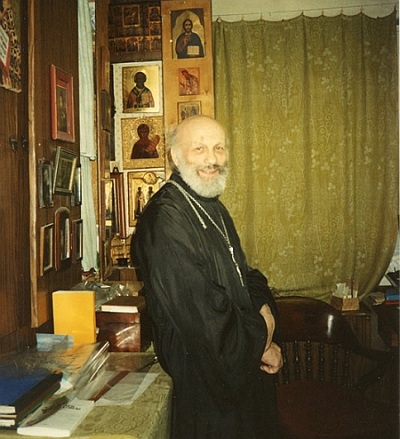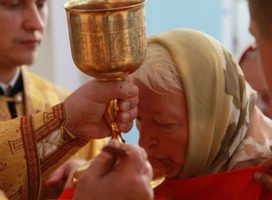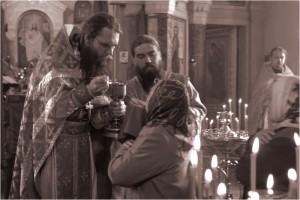The main thing in our lives is participation in the Liturgy and reception of the Divine Mysteries of Christ. Simply put, all our troubles and misfortunes are bound up with our attitude towards the Eucharist. And, if we are to speak of the Eucharist, the essential boundary between the Church and heretics is drawn with regard to the Eucharist. For us it is the Mystery of Mysteries; we partake of the true Body and the true Blood of our Lord Jesus Christ.
I have had many occasions in life to see terrible and horrible things. But the most terrible was to see the Lord’s Blood spilled on the church carpet and His Body fallen there. The rector and I crawled around, gathering this greatest of holy things. If the Body, a particle of Communion, falls to the ground in church, services are discontinued until receiving the bishop’s permission.
If we look at the Lutherans, for example, they do not partake of the Body and Blood of the Lord Jesus Christ; they perform a breaking of the bread in memory of the Mystical Supper – but this is not a sacred object for them.
Thus, with regard to Communion, a boundary is drawn.
Both the Armenian and Catholic Churches have Communion, but there is a difference in attitude towards it. But we must approach the Body of Christ with great trembling and fear of God.
If we are to speak of the first centuries, everyone present at the Liturgy partook of the Body and Blood. If someone did not receive Communion for three weeks – three Sundays – he was considered expelled from the church community. But now we have people who do not receive Communion for months or years. You ask: “When was the last time?” They reply: “Either last year, or the year before.” One should receive Communion, at the very minimum, four times a year during the fasts. The question arises: “Perhaps we, as in the first centuries, could receive Communion every Sunday and at every service we attend?” We likely have not matured to this level. If you receive Communion every Sunday, then you need to live in our Lord Jesus Christ.
When I am asked how often one should receive Communion, I say that I do not know. One person should receive Communion four times a year, while another should partake every Sunday, depending on their spiritual condition. But, unfortunately, when we need to approach Communion, as the prayers say, “with fear of God” (on Athos, as I have already told you, they add “and love) – how do we in fact approach? In the very last prayer before Communion, we read: “I stand before the doors of Thy temple, yet I do not put away evil thoughts.” I do not back away from evil thoughts! That means that we do not back away from evil thoughts even while here, in church, before Communion! This is because we are too tied up with this world; our transgressions are dear to us and we have no desire to part ways with them. How often one hears: “But I don’t want to give it up!” It is the same with Confession: if one does not repent, one cannot receive Communion. I once had a confessant who said: “But I don’t want to change my life!” What was I supposed to do in such a situation? I left without reading the prayer of absolution over him. If you want to live in your old ways, that means that you have neither confessed nor repented, so there can be no remission of sins; it means that you cannot approach Holy Communion.
Christ said: he that eateth Me, even he shall live by Me (John 6:57) – he who eats Him, not he who remembers the Mystical Supper. And we, having partaken of the true Blood and Body of our Lord Jesus Christ, within two or three days forget that we are bearing this Body within ourselves and that we should bear this memory with reverence. Christ’s Blood, as has been discovered, was blood of the first group [O-]; that is, He was a universal donor. Is this a coincidence or a great mystery? Of course, it is a great and real mystery. If we commune of the Blood of our Lord Jesus Christ, we are co-communicants with one another. The Blood of our Lord Jesus Christ is flowing within each of us who receives Communion. It follows that we are brothers and sisters in Christ’s Blood. Therefore, what sort of relations should there be among us? That of brother and sister. Unfortunately we have lost this brotherly and sisterly attitude in our families; but here, in the church community, it should be maintained among all the faithful who jointly participate in the Liturgy.
We partake of the Holy Chalice for the remission of sins. If we partake of the Body and Blood of Our Lord Jesus Christ, then we should be very attentive to ourselves: to our words, to our actions, to our prayers, and to our relations with our loved ones. For we partake to our condemnation if we do so unworthily, or if we partake without being attentive to ourselves afterwards. Indeed, we partake only by the mercy of our Lord Jesus Christ.
We pray: “I stand before the doors of Thy temple, yet I do not put away evil thoughts. But do Thou, O Christ God, Who didst justify the publican, and didst have mercy on the woman of Canaan, and didst open the doors of paradise to the thief, open unto me the abyss of Thy love for mankind, and receive me as I come and touch Thee… And I, a wretch, daring to receive Thy whole Body, let me not be consumed by fire.” The Holy Mysteries can consume by fire. There have been cases when someone, daring to receive them unworthily, has been punished. Let us pray that the Lord’s mercy will be with all you communicants; that this Body and this Blood of which you will today eat and receive into yourselves might be for healing of your soul and bodies; and that you might feel yourselves to be brothers and sisters.
He that eateth Me, even he shall live by Me. Let us ask ourselves: “How have we lived? Have we lived by Christ or by ourselves and the world?”
He that eateth Me, even he shall live by Me. If we are Christians, then we must give heed to these words, given in commandment by God Himself.
I call upon all communicants to be especially attentive to approach the Communion of the Holy Gifts with fear; and to be attentive to yourselves all the remaining days of your lives.
Translated from the Russian


















